By now, I imagine you already know what a cryptocurrency wallet is. To review, a wallet is the place where you securely store your cryptos.
With a wallet, you can also send and receive cryptocurrencies. When it comes to something as valuable as this, we must pay special attention to security.
In this article, I’m going to focus on analyzing the most secure cryptocurrency wallets on the market, to help you make an informed decision when choosing the one that best suits your needs and preferences.
Types of wallets
First things first, do you know what two types of wallets there are? It’s simple:
- Hot wallets
- Cold wallets
The first ones (hot wallets) are connected to the internet, whereas cold wallets are physical devices that are NOT connected to the network.
So how do cold wallets work?
With the public address of your wallet, you can receive payments from any exchange. And on the other hand, your private key will serve you to transfer and control the stored cryptos. That is, the private key must be private. Don’t shout it from the rooftops and don’t whisper it either; if you lose it, there will be no way to recover your cryptos. On the other hand, the public address is like your home address, which you can share with Amazon to receive packages, for example.
Which type of wallet is the safest?
If one is connected to the internet and the other is not, which one do you think is the safest wallet of the two?
Exactly, with cold wallets, we avoid any hacking attempts. It is entirely possible for anyone to remotely access your cryptocurrencies, in fact and unfortunately, there are quite a few cases.
Note that I’m not trying to demonize hot wallets, which are very convenient for day-to-day transactions. However, in this article, I’m focusing on security when storing cryptocurrencies in one place, and cold wallets undoubtedly win by a landslide in this aspect.
Below is a comparison table of hot vs. cold wallets for you to look at their main characteristics.
| Feature | Hot Wallets | Cold Wallets |
|---|---|---|
| Connectivity | Always connected to the internet | Not connected to the internet |
| Security | Less secure than cold wallets, more vulnerable to cyber attacks | More secure than hot wallets, less vulnerable to cyber attacks |
| Storage Type | Online, usually on mobile devices or in the cloud | Offline, on physical devices such as USB, paper, or specialized hardware |
| Usability | Easy to use, with a user-friendly interface and quick access | Require a more complex process to access cryptocurrencies, which can be less intuitive for less experienced users |
| Transfers | Allow fast and easy transactions over the internet | Require a more complex and manual process to perform transactions, which can take longer |
| Price | In general, they are free or low-cost | They usually have a higher cost than hot wallets due to their higher level of security |
Now that we’ve taken hot wallets out of the equation, let’s move on to the next important point.
Types of Cold Wallets
Within cold wallets, we can differentiate 5 types:
- Paper wallets: They are totally disconnected from the internet and yes, it’s a piece of paper with your keys that you must keep in a totally safe place.
- USB/hardware wallets: These are practically the best known, they are characterized by being electronic. The USB is connected to the computer when transactions are to be made. Perhaps you’ve heard of Ledger or Trezor, as they are among the most well-known currently.
- Software-based cold wallets: Electrum and Armory are two wallets that we would classify under this point. They are similar to a hot wallet because they are somehow connected to the internet. However, the software runs offline or disconnected, like when you put your mobile phone in airplane mode, for example,
- Online cold wallets: These are hot wallets that offer cold wallet service through a temporary disconnection. During this disconnection is when you enter the keys, then they connect back to the network.
- Non-electronic wallets: There are no electronic materials and they are not connected to the internet at any time. You only enter your private key or address on the exchange when you are going to send cryptos to the wallet or perform any transaction.
Okay, after all the options we’ve just seen, let’s start ruling them out one by one with arguments that defend security, as that’s what this is all about.
Hardware wallets: Since they are electronic devices, they can deteriorate. Imagine dropping them in water or accidentally stepping on them. There go your keys.
Paper wallets: No one can steal your keys, but what if the paper breaks or gets wet? Paper is very delicate.
The USB wallets allow you to store and manage multiple cryptocurrencies on a single device, and you can easily make transactions. However, USB wallets can easily break or become damaged, and if this happens, you will also lose your keys. In comparison, paper wallets are more secure because they are not vulnerable to technical failures, but they are vulnerable to water or fire, for example.
Software-based cold wallets: It is true that the keys are kept offline, but what if your device has a virus? In addition, creating offline transactions is not simple for any user.
Online cold wallets: since they are directly connected to your hot wallet, they do connect to the internet at some point, which generates the same problem as hot wallets: hackers.
Have you figured out the winner yet?
Bingo! Non-electronic wallets are the winners in terms of security. They are usually more resistant than paper wallets and USB wallets. Additionally, they do not connect to the internet at any time. These two characteristics make this type of wallet the safest today.
Non-electronic cold wallets are safer
There aren’t many wallets of this type on the market. Let’s focus on 2 of them. Both wallets are designed for non-experts in the world of cryptocurrencies, so that anyone without super technical knowledge can store their cryptos in a safe place.
- Material Bitcoin/ Material Ether: for Bitcoin and Ethereum respectively. It is an ultra-resistant metal plate, with the public address engraved on the plate itself, as well as the private key (protected by a metal vinyl).
- Ballet: the ballet wallet has similar characteristics to Material Bitcoin, however, the keys are printed on stickers, not engraved or stamped on the steel.
This makes the Ballet more like a paper wallet, but with the printing that the steel is doing something useful, but it is not.
The safest wallet for Bitcoin and Ethereum
Now I’m going to tell you about our wallet Material Bitcoin and why it is the safest on the market.
I’m not trying to sell you anything, you’ve seen how I argue each of the claims I write in these lines.
Material Bitcoin is an ultra-resistant steel plate. It has been tested with fire, water, and even strong impacts, and the plate really withstands. In fact, here’s a video where you can see how we left a plate in the middle of the Atlantic Ocean and how it survived.
As you can see, we were close to dying, but the plate remained intact after being submerged at a depth of 27.8m for 3 months.
Why do you think our wallet has a 100-year warranty? It’s because we really believe in what we do.
What cryptocurrencies can I store with Material Bitcoin ? With Material Bitcoin , you can only store Bitcoin. The good news is that, with the same manufacturing characteristics, we have Material Ether, created to store Ethereum.
They are the two most popular and valued cryptocurrencies today, ideal for safe long-term storage, as if they were a gold bar.
Material Bitcoin and Material Ether can be your cryptocurrency bar.
If you can think of a safer option than this, don’t hesitate to share it in the comments.

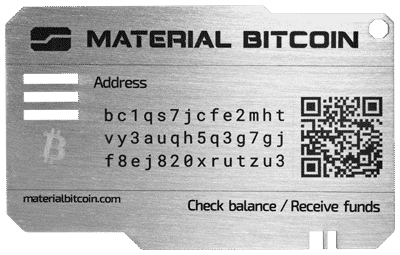

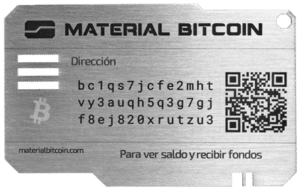
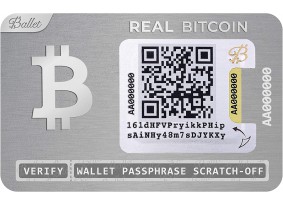




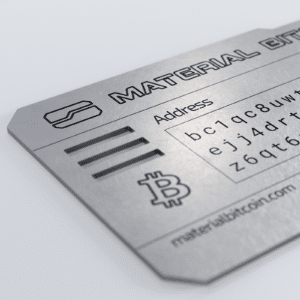
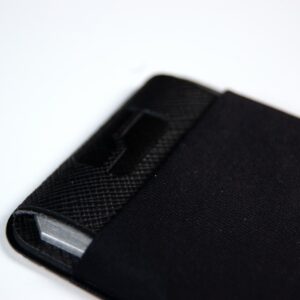

0 Comments